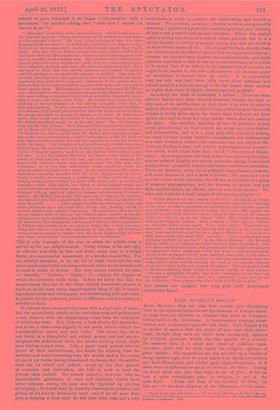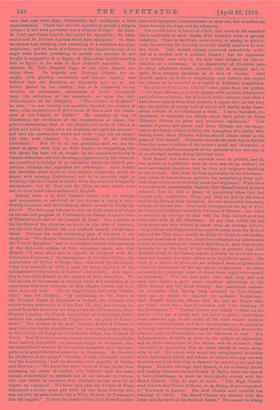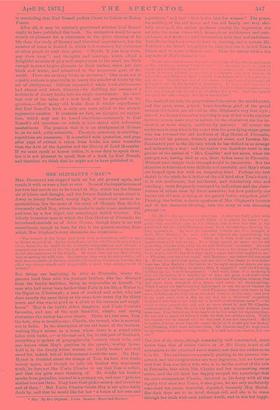EARL RUSSELL'S ESSAYS.* EARL RUSSELL does not take that sombre
and disquieting view of the spiritual prospects and speculations of Europe which, to judge from his allusions to Strauss's last work at Liverpool, forces itself on Mr. Gladstone. A characteristic courage, cheer- fulness, and complacency pervade this book. Earl Russell is by no means of opinion that the minds of men have been alarm- ingly, though they have no doubt been extensively, agitated by religious questions within the last quarter of a century. He assumes that, in a mind and creed of sufficient capa- ciousness, there will be room found for religious opinions of great variety. His sympathies are not pinched by a faculty of sharp, incisive logic, and he joins hands with Broad-Churchmen and Low-Churchmen, and smiles upon High-Churchmen, as if there were no difference to speak of between the three. Among his fixed ideas, the idea that logic is out of place, or has at best a quite subordinate place in religion, is one of the most fixed. " From the time of the Council of Nice," he tells us, "to the final adoption of the Athanasian Creed, when-
* Essays on the Rise and Progress of Me Christian Religion in The Wert of Europe, from the Reign of TiGerins to The End of The Council of Trent. By John, Earl ElumalL London: Longman& 1873.
ever that may have been, Christianity had undergone a total transformation. Christ had told his Apostles to preach a religion of love ; it had been perverted into a religion of logic. St. John, St. Paul, and Christ himself, had called for sympathy ; St. Atha- nasius and St. Thomas Aquinas relied upon syllogism." St. Paul, we cannot help thinking, had something of a weakness for argu- mentation; and his mode of reference to the hypothetic case of an angel from heaven presuming to modify the doctrine he had taught is suggestive of a degree of dogmatism hardly entitling him to figure as he does in Earl Russell's antithesis. But whether St. Paul despised logic or not, Earl Russell cer-
tainly does. He regards our National Church, for ex- ample, with glowing admiration and fervent loyalty, and believes that she flourishes as vigorously now as at any former period in her history ; but it is impossible to say whether his enthusiastic satisfaction is based principally upon the orthodoxy of her standards, or upon the lati- tudinarianism of her discipline. "The Church of England," he says, "in her Articles has carefully avoided two sources of error,—the superstitions of the Church of Rome and the fanati- cism of the Church of Calvin." He specifies, by way of illustrating her avoidance of the superstitions of Rome, her pointed declarations that, in the Supper, the body of Christ is given and taken "only after an heavenly and spiritual manner," and that the sacramental bread and wine "may not be adored (for that were idolatry, to be abhorred of all faithful Christians)." But he is no less gratified,—and we are dis- posed to agree with him on both heads,—in recognising that this theory has been set at naught by the supreme authority in Church discipline, and that the clergy, represented by Mr. Bennett, are permitted to indulge in an adoration which the Church pro- nounces idolatry and signalises for abhorrence. Earl Russell has doubtless owed much to that resolute illogicality which he shares with average Englishmen, and be is probably right in believing that the Church is stabler than she would be if logically unassailable ; but St. Paul and Sc. John, we may admit, were not on these heads characteristically English.
Indeed, there is in Earl Russell's habits both of thought and composition, as exhibited in this volume, a laxity, a loose- flowing largeness and indefiniteness, which cannot be wholly ap- proved. The title-page informs us that the book consists of essays on the rise and progress of Christianity in Europe from the time of Tiberius to the end of the Council of Trent. But a glance at the headings of the chapters, as given in the table of contents, reveals that Earl Russell has not confined himself within these limits. Perhaps the most interesting part of the work is the chapter on "The Roman Catholic Church and the Constitution of the United Kingdom," and it is occupied wholly with questions of the day,—the system of Irish education, which, says Earl Russell, "I have often had to defend, in company with Mr. Chichester Fortescue ;" the assumptions of Cardinal Cullen ; the misfortunes of Father O'Keefe, who, victimised by the Jesuits, "has lost upwards of £300 a year, by being deprived of the management of the schools of Callan ;" and so forth. It is appal- ling to hear Earl Russell on the subject of Irish education. We had no idea of the amount of calamity which had overtaken us in connection with that business, or that Magna Chaste had been once more set aside. "Every Englishman and every Scotch- man," says his lordship, "by submitting to the decree of the National Board of Education in Ireland, has virtually con- sented to the supremacy of Pope Pius IX., and has thereby de- parted from the precedent set long before the Reformation, when Stephen Langton, the Popish Archbishop of Canterbury, boldly asserted the independence of England on the plain of Runny- mede." The decrees of the Irish National Board of Education may have this terrific significance, but they surely cannot belong to the history of European Christianity before the Council of Trent. Earl Russell mixes up ancient and modern times with his usual dashing intrepidity ; he does not scruple to introduce, also, the conventional sarcasm of the modern pamphlet into what pur- ports to be grave historical narrative or discussion. St. Dominic he alludes to as the alleged "founder of that admirable institu- tion the Inquisition," and he discourses thus jauntily of Galileo and Newton :—" We know that the Church of Rome, so far from tolerating the errors of Galileo, who believed that the earth moved, endeavoured to persuade him of his mistake by torture, and was unable to convince that obstinate heretic even by so cogent an argument. We know also that the Church of Rome denounced a similar error put forth by one Isaac Newton, who was not only an arch-heretic, but a Whig Member of Parliament into the bargain." It must be admitted that Earl Russell's toler-
ance and sympathy, comprehensive as they are, fail to soften his heart towards the Pope and his adherents.
The candid critic is forced to admit that, tried by the standard fairly applicable to such works, Earl Russell's book is gravely defective. There is, we think, more civility in saying so plainly, than in assuming his lordship to be too weakly sensitive to hear the truth. Earl Russell always possessed remarkable quali- ties as a speaker and a political thinker ; but his reputation as a literary man was in his beet time eclipsed by his re- putation as a statesman. In no department of literature have so many admirable works, masterly alike in thought and in style, been recently produced as in that of history. Earl Russell makes no claim to originality, and nobody can expect, his volume to be accepted as a useful or felicitous compilation. "The History of the Latin Church"—we quote from .his preface —"by Dean Milinan, is a work replete with accurate information and judicious criticism ; but it is in six bulky volunies, and while I have drawn largely from their contents, I expect that, in this busy age, the readers of poetry and of novels will hardly make them- selves masters of so voluminous a work. I have, therefore, en- deavoured to condense the details which have given to Dean Milnsan's History its great and unenvied reputation." Few readers of poetry and novels read Dean Milman, but our imagi- nation absolutely refuses to form the conception of a reader who, having found Dean Milman tedious, should obtain relief in the pages of Earl Russell. Whatever interest the book has is derived from the image it reflects of the author's mind and character ; it cannot be accepted as a synopsis of the opinions of any one else, or as an abridged version of any historical work.
Earl Russell was never an inventor even in politics, and he was greater as a politician than he ever was as an author ; we need not wonder, therefore, that he does not originate anything in this volume. But, from his first appearance in the Parliamen- tary arena, he has shown an aptitude for assimilating those poli- tical ideas which more inventive minds had originated. While ideas were advanced, questionable, Radical, Earl Russell looked at them askance ; but he had a knack of perceiving when they had become safe, respectable, Whig, and then he pat on the steam and strode forth as their champion. On two memorable occasions, indeed, he was too late. Free-trade chirruped on the lap of Peel, and household suffrage crowed in the arms of Disraeli ; nor could he summon up courage to deal with the Irish Church as it has been dealt with by Mr. Gladstone. At any time within the last forty years one who wished to know what an average Liberal, —a politician standing at about an equal distance from the Radical van and the Tory rear,—would be likely to think on the leading political questions of the day, might have obtained the information sought by ascertaining the views of Earl Russell. And what chiefly interests us in this book is the evidence it presents that Earl Russell's mind, in its literary aspect, is liberal in much the same sense and to much the same extent as in its political aspect. His book is a mirror in which we see reflected those religious ideas which the intelligence of the age can no longer resist. So lately as twenty-five years ago some of those ideas might have seemed revolutionary. We are not quite sure that they will not even now startle a good many excellent subscribers to the Bible Society and the Tract Society. But precedents warrant the conclusion that, having been accepted by Earl Russell, they can no longer be rejected by ordinary Englishmen. Earl Russell distinctly affirms that we can no longer take our stand upon what Low-Churchmen call "the theology of the Reformation." "Neither Luther nor Calvin "—these are his words—" the one a monk and the other a priest, conteudiug three centuries ago, in the midst of the most violent conflicts between old institutions and new speculations, can be looked to- as having arrived at conclusions upon which mankind, or even the educated part of Christendom, can be contented to rest." The Reformers were, he holds, in error on the subject of inspiration, and in their conceptions of the human will as enslaved ; they were right in demanding that the Bible should be made acces- sible to all. He rejects with scorn the metaphysical subtleties of the Athanasian Creed, and refuses to believe that any one will be either saved for believing or damned for rejecting cut-and-dry dogmas. In short, although Earl Russell, in his uniformly severe and slashing references to the Church of Rome, takes the tone of a Low-Churchman, he must be theologically classed with the Broad Church. Nay, he says as much. "The High Church tend towards the Church of Rome, or, as Bishop Pearce expressed it, Tendimus in Latium.' The Low Church tend towards the teaching of Calvin. The Broad Church are content with the letter and the spirit of the words of Christ." We cannot be wrong in concluding that Earl Russell prefers Christ to Calvin or Bishop Pearce.
After all, it may be seriously questioned whether Earl Russell ought to have published this book. No occupation could be more seemly or pleasant for a statesman in the quiet evening of his life than the study of literary and historical masterpieces, but the number of cases is limited in which it is necessary for statesmen or other people to rush into priut. " Words, if you keep them, pay their keep "; and thoughts and musings, which afford a delightful mixture of play and employment to the mind, are likely enough to cease to give pleasure to their author, when put into black and white, and submitted to the irreverent gaze of the world. There are so many books in existence ! One main use of capable authors is practically to lessen the number of books by the art of abridgment. Gibbon superseded whole book-shelves—we had almost said whole libraries—by distilling the essence of a multitude of dreary books into his single masterpiece. An vxcel- lent test of the value of a new book may be proposed in the question,—How many old books does it render superfluous? But Earl Russell's book is only one more added to the already oppressive number. It contains no fact, no thought, no sugges- tion, which may not be found elsewhere—commonly in Earl Russell's old speeches—or which is here stated with redeeming rnsusterliness. The position that it is an abridgment of Milman is, as we said, quite untenable. The style, moreover, is rambling ; repetitions are numerous. It is overlaid with quotation, and page after page of extract is taken from books not more recondite than the Acts of the Apostles and the History of Lord Macaulay. If we must speak as honest critics, it is our duty to speak thus ; but it is not pleasant to speak thus of a book by Earl Russell, and therefore we think that he ought not to have published it.




































 Previous page
Previous page